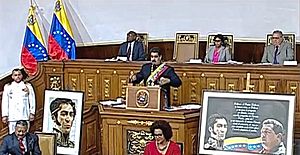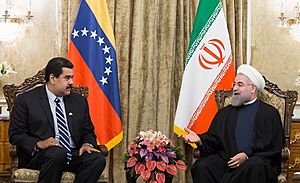Nicolás Maduro facts for kids
Quick facts for kids
Nicolás Maduro
|
|
|---|---|
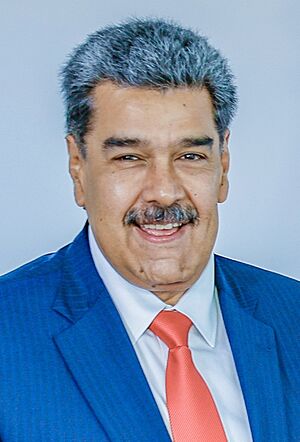
Maduro in 2023
|
|
| 53rd President of Venezuela | |
|
Disputed
|
|
| Assumed office 19 April 2013 Acting: 5 March – 19 April 2013 |
|
| Vice President |
|
| Preceded by | Hugo Chávez |
| President of the United Socialist Party of Venezuela | |
| Assumed office 5 March 2013 |
|
| Vice President | Diosdado Cabello |
| Preceded by | Hugo Chávez |
| 24th Vice President of Venezuela | |
| In office 13 October 2012 – 19 April 2013 |
|
| President |
|
| Preceded by | Elías Jaua |
| Succeeded by | Jorge Arreaza |
| Minister of Foreign Affairs | |
| In office 9 August 2006 – 13 October 2012 |
|
| President | Hugo Chávez |
| Preceded by | Alí Rodríguez Araque |
| Succeeded by | Elías Jaua |
| 3rd President of the National Assembly of Venezuela | |
| In office 5 January 2005 – 7 August 2006 |
|
| Preceded by | Francisco Ameliach |
| Succeeded by | Cilia Flores |
| Member of the National Assembly of Venezuela for Capital District |
|
| In office 3 August 2000 – 7 August 2006 |
|
| Secretary General of the Non-Aligned Movement | |
| In office 17 September 2016 – 25 October 2019 |
|
| Preceded by | Hassan Rouhani |
| Succeeded by | Ilham Aliyev |
| President pro tempore of the Union of South American Nations | |
| In office 23 April 2016 – 21 April 2017 |
|
| Preceded by | Tabaré Vázquez |
| Succeeded by | Mauricio Macri |
| Personal details | |
| Born |
Nicolás Maduro Moros
23 November 1962 Caracas, Republic of Venezuela |
| Political party | United Socialist Party of Venezuela (since 2007) |
| Other political affiliations |
Fifth Republic Movement (until 2007) |
| Spouses | Adriana Guerra Angulo (div.) |
| Children | Nicolás Maduro Guerra |
| Residence | Miraflores Palace |
| Occupation |
|
| Signature |  |
Nicolás Maduro Moros (Spanish pronunciation: [nikoˈlas maˈðuɾo ˈmoɾos]; born 23 November 1962) is a Venezuelan politician serving as the 53rd president of Venezuela since 2013. Previously, he was the 24th vice president of Venezuela from 2012 to 2013, the minister of foreign affairs from 2006 to 2012, and the 3rd president of the National Assembly of Venezuela from 2005 to 2006.
Beginning his working life as a bus driver, Maduro rose to become a trade union leader before being elected to the National Assembly in 2000. He was appointed to a number of positions under President Hugo Chávez, serving as President of the National Assembly from 2005 to 2006, as Minister of Foreign Affairs from 2006 to 2012 and as the vice president from 2012 to 2013 under Chávez. After Chávez's death was announced on 5 March 2013, Maduro assumed the presidency. A special presidential election was held in 2013, where Maduro was declared the winner with 50.62% of the vote as the United Socialist Party of Venezuela candidate. He has ruled Venezuela by decree since 2015 through powers granted to him by the ruling party legislature.
Shortages in Venezuela and decreased living standards led to a wave of protests in 2014 that escalated into daily marches nationwide, repression of dissent and a decline in Maduro's popularity. An opposition-led National Assembly was elected in 2015 and a movement toward recalling Maduro began in 2016, which was ultimately cancelled by Maduro's government; Maduro maintained power through the Supreme Tribunal, the National Electoral Council (CNE) and the military. The Supreme Tribunal removed power from the elected National Assembly, resulting in a constitutional crisis and another wave of protests in 2017. As a response to the protests, Maduro called for a rewrite of the constitution, and the Constituent Assembly of Venezuela was elected in 2017 under voting conditions that many concluded were irregular. On 20 May 2018, presidential elections were held; President Maduro was sworn in on 10 January 2019 with widespread condemnation, and the president of the National Assembly, Juan Guaidó, was declared interim president on 23 January 2019 by the opposition legislative body—kicking off a presidential crisis that spanned nearly four years and divided the international community. In 2024, he ran for a third term in an election which the Maduro-aligned CNE claimed he won—without providing evidence—casting Venezuela into a political crisis. The opposition gathered vote tallies that showed their candidate, Edmundo González, had won the most votes. Maduro was sworn in for his third term on 10 January 2025.
Maduro heads an authoritarian government, and has been described as an autocrat and a dictator. Between 2013 and 2023, Venezuela dropped 42 places in the Press Freedom Index. According to estimations by the United Nations (UN) and Human Rights Watch, under Maduro's administration, more than 20,000 people have been subject to extrajudicial killings and seven million Venezuelans have been forced to flee the country. The UN Fact-Finding Mission on Venezuela concluded that the country's justice system independence has been deeply eroded; the mission also identified frequent due process violations, including political external interference and the admission of evidence through torture. Most Venezuelan television channels are controlled by the state, and information unfavourable to the government is not covered completely. In 2018, a Board of Independent Experts designated by the Organization of American States (OAS) alleged that crimes against humanity have been committed in Venezuela during Maduro's presidency. In 2021, the Office of the Prosecutor of the International Criminal Court (ICC) announced the opening of an investigation regarding the situation in the country.
Contents
Early and personal life
Nicolás Maduro Moros was born on 23 November 1962 in Caracas, Venezuela, into a working-class family. His father, Nicolás Maduro García, who was a prominent trade union leader, died in a motor vehicle accident on 22 April 1989. His mother, Teresa de Jesús Moros, was born in Cúcuta, a Colombian border town at the boundary with Venezuela. He was born into a leftist family and "militant dreamer of the Movimiento Electoral del Pueblo (MEP)". Maduro was raised in Calle 14, a street in Los Jardines, El Valle, a working-class neighborhood on the western outskirts of Caracas. The only male of four siblings, he had "three sisters, María Teresa, Josefina, and Anita".
Maduro was raised as a Roman Catholic. In 2012 it was reported that he was a follower of Indian Hindu guru Sathya Sai Baba and previously visited the guru in India in 2005. He stated in a 2013 interview that "my grandparents were Jewish, from a Sephardic Moorish background, and converted to Catholicism in Venezuela".
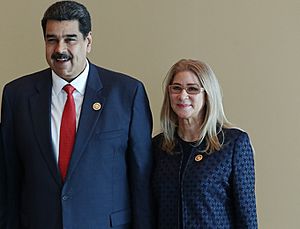
Maduro has been married twice. His first marriage was to Adriana Guerra Angulo, with whom he had his only son, Nicolás Maduro Guerra, also known as "Nicolasito", who was appointed to several senior government posts (Chief of the Presidency's Special Inspectors Body, head of the National Film School, and a seat in the National Assembly). He later married Cilia Flores, a lawyer and politician who replaced Maduro as president of the National Assembly in August 2006, when he resigned to become Minister of Foreign Affairs, becoming the first woman to serve as president of the National Assembly. The two had been in a romantic relationship since the 1990s when Flores was Hugo Chávez's lawyer following the 1992 Venezuelan coup d'état attempts and were married in July 2013 months after Maduro became president. While they have no children together, Maduro has three step-children from his wife's first marriage to Walter Ramón Gavidia; Walter Jacob, Yoswel, and Yosser.
Maduro is a fan of John Lennon's music and his campaigns for peace and love. Maduro has said that he was inspired by the music and counter-culture of 1960s and 70s, mentioning also Robert Plant and Led Zeppelin. During the 2023 Israel–Hamas war, Maduro declared that "Jesus Christ was a young Palestinian unjustly crucified by the Spanish Empire".
Early career
Education and union work
Maduro attended a public high school, the Liceo José Ávalos, in El Valle. His introduction to politics was when he became a member of his high school's student union. According to school records, Maduro did not graduate from high school.
According to Carlos Peñaloza, Maduro was considered a person of interest by Venezuelan authorities in the kidnapping of William Niehous, an American businessman and head of Owens-Illinois in Venezuela, who was held hostage by leftist militants who would later become close to Hugo Chávez.
Maduro found employment as a bus driver for many years for the Caracas Metro company. He began his political career in the 1980s, by becoming an unofficial trade unionist representing the bus drivers of the Caracas Metro system. He was also employed as a bodyguard for José Vicente Rangel during Rangel's unsuccessful 1983 presidential campaign.
At 24 years of age, Maduro resided in Havana with other militants of leftist organizations in South America who had moved to Cuba in 1986, attending a one-year course at the Escuela Nacional de Cuadros Julio Antonio Mella, a centre of political education directed by the Union of Young Communists. During his time in Cuba, Maduro was instructed by Pedro Miret Prieto, a senior member of the Politburo of the Communist Party of Cuba who was close to Fidel Castro.
MBR–200
According to Carlos Peñaloza, Maduro was allegedly tasked by the Castro government to serve as a "mole" working for the Cuba's Dirección de Inteligencia to approach Hugo Chávez, who was experiencing a burgeoning military career.
In the early 1990s, he joined MBR-200 and campaigned for the release of Chávez when he was jailed for his role in the 1992 Venezuelan coup d'état attempts. In the late 1990s, Maduro was instrumental in founding the Movement of the Fifth Republic, which supported Chávez in his run for president in 1998.
National Assembly
Maduro was elected on the MVR ticket to the Venezuelan Chamber of Deputies in 1998, to the National Constituent Assembly in 1999, and finally to the National Assembly in 2000, at all times representing the Capital District. The Assembly elected him as Speaker, a role he held from 2005 until 2006.
Foreign minister of Venezuela
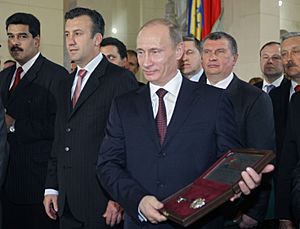
Maduro was appointed Minister of Foreign Affairs in 2006, and served under Chávez in that position until being appointed Vice President of Venezuela in October 2012, after the presidential elections. According to BBC Mundo, during Maduro's tenure as foreign minister, "he was considered a key player in pushing the foreign policy of his country beyond Latin American borders to approach almost any government that rivaled the United States."
Venezuela's foreign policy stances during his term included ending unofficial relations with Taiwan in favor of the People's Republic of China, support for Libya under Muammar Gaddafi, breaking off diplomatic ties with Israel during the 2008–09 Gaza War, recognizing and establishing diplomatic relations with the State of Palestine, a turnaround in relations with Colombia in 2008 (with Ecuador) and again in 2010, recognizing Abkhazia and South Ossetia as independent states, and support for Bashar al-Assad during the Syrian Civil War.
Temir Porras, a 2019 visiting professor at Paris Institute of Political Studies who was Maduro's chief of staff during his tenure as foreign minister, said that in the early days of Chavismo, Maduro was considered "pragmatic" and a "very skilled politician" who was "good at negotiating and bargaining". Porras said the Maduro "was extremely effective at getting in touch with heads of state and getting the agreements (...) signed and achieved in a very rapid period of time". According to Rory Carroll, Maduro did not speak any foreign languages while serving as the Minister of Foreign Affairs.
2006 detention in New York
In September 2006, while attempting to travel back to Venezuela via Miami, Florida, Maduro was briefly detained by Homeland Security officers at the John F. Kennedy International Airport for around 90 minutes, after paying for three airline tickets in cash. Both Maduro and President Hugo Chávez were in New York City attending the 61st session of the UN General Assembly, where President Chávez called US President George W. Bush "the devil" during his speech.
The incident began when Maduro tried to pick up an item that had been screened at a security checkpoint at JFK International Airport, and security personnel told Maduro that he was prohibited from doing so. Maduro later identified himself as a diplomat from the Venezuelan government, but officials still escorted him to a room for conducting secondary screening. At one point, authorities ordered Maduro and other Venezuelan officials to spread their arms and legs and be frisked, but Maduro and others forcefully refused. His diplomatic passport and ticket were retained for a time, and finally given back to him.
Speaking at the Venezuelan mission to the UN after his release, Maduro said his detention by the US authorities was illegal and he filed a complaint at the United Nations. US and UN officials called the incident regrettable but said Maduro had been identified for "secondary screening". Homeland Security spokesman Russ Knocke denied that Maduro was mistreated, saying that there was not evidence of abnormalities during the screening process. A UN diplomat said that Maduro was not authorized to speak publicly while his trip was delayed because he had shown up late without a ticket, prompting the screening. Maduro said the incident prevented him from traveling home on the same day.
When he was informed of the incident, President Chávez said Maduro's detention was retaliation for his own speech at the UN General Assembly and stated that the authorities detained Maduro over his links to the Venezuelan failed coup in 1992, a charge that President Chávez denied.
Vice President of Venezuela
Prior to his appointment to the vice presidency, Maduro had been chosen by Chávez in 2011 to succeed him in the presidency if he were to die from cancer. This choice was made due to Maduro's loyalty to Chávez and because of his good relations with other chavistas such as Elías Jaua, former minister Jesse Chacón and Jorge Rodríguez. Bolivarian officials predicted that following Chávez's death, Maduro would have political difficulties and that Venezuela would experience instability.
Chávez appointed Maduro Vice President of Venezuela on 13 October 2012, shortly after Chavez' victory in that month's presidential election. Two months later, on 8 December 2012, Chávez announced that his recurring cancer had returned and that he would be returning to Cuba for emergency surgery and further medical treatment. Chávez said that, should his condition worsen and a new presidential election be called to replace him, Venezuelans should vote for Maduro to succeed him. This was the first time that Chávez named a potential successor to his movement, as well as the first time he publicly acknowledged the possibility of his death.
Chávez's endorsement of Maduro sidelined Diosdado Cabello, a former vice president and powerful Socialist Party official with ties to the armed forces, who had been widely considered a top candidate to be Chávez's successor. After Maduro was endorsed by Chávez, Cabello "immediately pledged loyalty" to both men.
Interim president
Upon the death of Hugo Chávez on 5 March 2013, Maduro assumed the powers and responsibilities of the president. He appointed Jorge Arreaza to take his place as vice president. Since Chávez died within the first four years of his term, the Constitution of Venezuela stated that a presidential election had to be held within 30 days of his death. Maduro was unanimously chosen as the Socialist Party's candidate in the election. When he assumed temporary power, opposition leaders argued that Maduro violated articles 229, 231, and 233 of the Venezuelan Constitution, by assuming power over the president of the National Assembly.
President of Venezuela
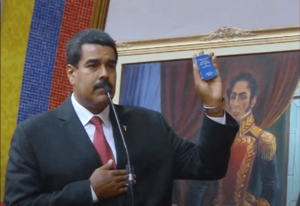
The succession to the presidency of Maduro in 2013, according to Corrales and Penfold, was due to multiple mechanisms established by Maduro's predecessor, Chávez. Initially, oil prices were high enough for Maduro to maintain necessary spending for support, specifically with the military. Foreign ties that were established by Chávez were also used by Maduro as he applied skills that he had learned while serving as a foreign minister. Finally, the PSUV and government institutions aligned behind Maduro, and "the regime used the institutions of repression and autocracy, also created under Chávez, to become more repressive vis-à-vis the opposition".
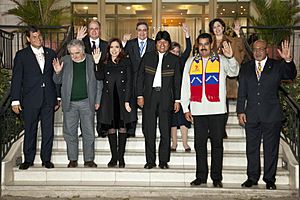
In April 2013, Maduro was elected president, narrowly defeating opposition candidate Henrique Capriles with just 1.5% of the vote separating the two. Capriles demanded a recount, refusing to recognize the outcome as valid. Maduro was inaugurated as president on 19 April, after the election commission had promised a full audit of the election results. In October 2013, he announced the creation of a new agency, the Vice Ministry of Supreme Happiness, to coordinate social programmes.
Opposition leaders in Venezuela delivered a May 2016 petition to the National Electoral Council (CNE) calling for a recall referendum, with the populace to vote on whether to remove Maduro from office. On 5 July 2016, the Venezuelan intelligence service detained five opposition activists involved with the recall referendum, with two other activists of the same party, Popular Will, also arrested. After delays in verification of the signatures, protestors alleged the government was intentionally delaying the process. The government, in response, argued the protestors were part of a plot to topple Maduro. On 1 August 2016, CNE announced that enough signatures had been validated for the recall process to continue. While opposition leaders pushed for the recall to be held before the end of 2016, allowing a new presidential election to take place, the government vowed a recall would not occur until 2017, ensuring the current vice president would potentially come to power.
In May 2017, Maduro proposed the 2017 Venezuelan Constituent Assembly election, which was later held on 30 July 2017 despite wide international condemnation. The United States sanctioned Maduro following the election, labeling him as a "dictator", preventing him from entering the United States. Other nations, such as China, Russia, and Cuba offered their support to Maduro and the Constituent Assembly elections. The presidential elections, whose original electoral date was scheduled for December 2018, was subsequently pulled ahead to 22 April before being pushed back to 20 May. Analysts described the poll as a show election, with the elections having the lowest voter turnout in the country's democratic era.
Beginning six months after being elected, Maduro was given the power to rule by decree by the pre-2015 Venezuelan legislature (from 19 November 2013 to 19 November 2014, 15 March 2015 to 31 December 2015) and later by the Supreme Tribunal (since 15 January 2016) to address the ongoing economic crisis in the country, with strong condemnation by the Venezuelan opposition claiming that the legislature's power had been usurped by the court. His presidency has coincided with a decline in Venezuela's socioeconomic status, with crime, inflation, poverty and hunger increasing; analysts have attributed Venezuela's decline to both Chávez and Maduro's economic policies, while Maduro has blamed speculation and economic warfare waged by his political opponents.
A 2018 Amnesty International report "accused Nicolas Maduro's government of committing some of the worst human rights violations in Venezuela's history". The report found the violence was carried out especially in Venezuela's poor neighborhoods, and included "8,292 extrajudicial executions carried out between 2015 and 2017". In one year, 22% of homicides (4,667) were committed by security forces. Amnesty International's Erika Guevara-Rosas said, "The government of President Maduro should guarantee the right to life, instead of taking the lives of the country's young people."
During the later years of Maduro's presidency, pro-government police and military forces launched the "Liberation of the People Operation", which they stated targeted street gangs and non-state paramilitary formations which they alleged had taken control of poor neighbourhoods. The operations reportedly resulted in thousands of arrests and an estimated 9,000 deaths, with the Venezuelan opposition claiming that the operations are actually a state instrument of repression. The UN subsequently released a report condemning the violent methods of the operation. Although the Venezuelan Government's Ombudsman, Tarek William Saab has admitted that his office received dozens of reports of "police excesses", he defended the need for the operations and stated that his office would be working alongside the police and military "to safeguard human rights". The Venezuelan Foreign Ministry has criticised the UN's report, calling it "neither objective, nor impartial" and listed what it believed were a total of 60 errors in the report.
On 4 August 2018, at least two drones armed with explosives detonated in the area where Maduro was delivering an address to military officers in Venezuela. The Venezuelan government claims the event was a targeted attempt to assassinate Maduro, though the cause and intention of the explosions is debated. Others have suggested the incident was a false flag operation designed by the government to justify repression of opposition in Venezuela.
Porras (Maduro's former chief of staff) said in 2019 that Maduro "delivered practically nothing in terms of public policy, in terms of direction" during his first term because, in Porras' opinion, "he does not have a clear vision for the country. He is very much focused on consolidating his power among his own peers in Chavismo and much less on exercising or implementing a strategic vision for the country." However, following increased international sanctions during the Venezuelan crisis in 2019, the Maduro government abandoned socialist policies established by Chávez, such as price and currency controls, which resulted in the country seeing a rebound from economic decline. .....
On 3 May 2020, Venezuelan security forces prevented an attempt to overthrow Maduro by armed Venezuelan dissidents. The attempt was organised by an American private security company, Silvercorp USA, headed by Jordan Goudreau and the men were trained in Colombia. Goudreau claimed the operation had involved 60 troops, including two former US special forces members. The Venezuelan government claimed the United States and its Drug Enforcement Administration (DEA) were responsible for the operation and had support from Colombia. Juan Guaidó denied involvement in the operation. Goudreau claimed that Guaidó and two political advisers had signed a contract with him for US$213 million in October 2019. Eight of the attackers were killed, with another thirteen, including two Americans, captured.
International relations
On 6 March 2014, marking the 1 year anniversary of Hugo Chavez's death, Maduro announced on live television that he was breaking diplomatic and commercial relations with Panama after the country's president Ricardo Martinelli expressed support for the demonstrators during the protests that began on 12 February and called on the OAS to investigate. Relations were later restored in July 2014, after Vice President Jorge Arreaza attended the inauguration of President Juan Carlos Varela.
On 11 August 2017, President Donald Trump said that he is "not going to rule out a military option" to confront the government of Maduro. On 23 January 2019, Maduro announced that Venezuela was breaking ties with the United States following President Trump's announcement of recognizing Juan Guaidó, the Venezuelan opposition leader, as the interim President of Venezuela.
Another diplomatic crisis with Panama occurred in 2018, after the Panamanian government imposed sanctions on Maduro and several key officials of the Bolivarian government. Venezuela responded by imposing reciprocal sanctions on Panamanian companies and as well as prominent Panamanian officials, including President Juan Carlos Varela. The diplomatic crisis ended on 26 April 2018 when President Maduro announced that he had called President Varela and agreed to the return of the ambassadors and the return of air communication between both countries.
On 14 January 2019, days after Brazil recognised Venezuelan opposition leader Juan Guaidó as the country's interim president, Maduro called Brazilian President Jair Bolsonaro "a Hitler of the modern era".
Maduro has a strategic partnership with Russian leader Vladimir Putin. After Russia invaded Ukraine in February 2022, Maduro discussed increasing cooperation with Russia. Due to the raised oil prices resulting from the conflict, conversations have begun between Maduro and US officials, suggesting the possibility of lifting of US sanctions on Venezuela and improved relations between the two countries. During the 2022 United Nations Climate Change Conference in November, multiple world leaders interacted with Maduro, including President of France Emmanuel Macron, Prime Minister of Portugal António Costa and American John Kerry, with President Macron addressing Maduro as "president" and stating "I would be happy if we could talk to each other for longer to engage in useful bilateral work for the region." Days later on 27 November, the United States eased sanctions on Venezuela and allowed Chevron Corporation to temporarily work with the Venezuelan government.
Maduro made an official state visit to Saudi Arabia in June 2023. He also visited China in September 2023, requesting China's support for Venezuela to join the economic bloc BRICS and saying he wanted China's investment in Latin America and the Caribbean to increase. Brazil's president Lula da Silva supported Maduro's request to join BRICS. During the visit, Maduro also signed an agreement that included the training of Venezuelan astronauts, expressing his wish to send Venezuelans to the Moon.
In the Israeli–Palestinian conflict, Maduro has frequently supported the Palestinian cause in international forums, declaring that "Jesus Christ was a young Palestinian unjustly crucified by the Spanish Empire". On 7 November 2023, he condemned Israel's actions in the Gaza Strip during the Israel–Hamas war and accused Israel of committing genocide against Palestinians in Gaza.
Maduro promoted a consultative referendum in Venezuela to support Venezuela's claim to the Essequibo region, which is disputed with, and controlled by, neighboring Guyana. The referendum took place on 3 December 2023, and a large majority (nearly 100%) voted in favour of Venezuela's claims, though it had a low turnout.
Assassination attempts
Maduro has faced numerous attempts at his life during his presidency.
In the 2018 Caracas drone attack incident, while giving a speech to rally, Maduro was targeted by two drones that exploded during a speech.
In September 2024, the Venezuelan police captured and arrested three Americans, two Spaniards, and a Czech national carrying sniper rifles and other munitions to allegedly assassinate Maduro. In a public statement, the Minister of Interior, Justice and Peace, Diosdado Cabello held the CIA and Spanish intelligence responsible for the coup attempt, calling it 'not surprising'. The minister shared that they had arrested yet another US military active-duty member, Wilber Joseph Castañeda, with evidence from his cell phone linking him to terrorist attacks during the 2024 Venezuelan presidential election.
Awards and honours
Revoked and returned awards and honours.
| Awards and orders | Country | Date | Place | Notes | |
|---|---|---|---|---|---|
| Order of the Liberator | 19 April 2013 | Caracas, Venezuela | Highest decoration of Venezuela, given to every president. | ||
| Order of the Liberator General San Martín (Revoked) | 8 May 2013 | Buenos Aires, Argentina | Highest decoration of Argentina awarded by political ally Cristina Fernández de Kirchner. Revoked on 11 August 2017 by President Mauricio Macri for human rights violations. | ||
| Order of the Condor of the Andes | 26 May 2013 | La Paz, Bolivia | Highest decoration of Bolivia. | ||
| Bicentenary Order of the Admirable Campaign | 15 June 2013 | Trujillo, Venezuela | Venezuelan order. | ||
| Star of Palestine | 16 May 2014 | Caracas, Venezuela | Highest decoration of Palestine. | ||
| Order of Augusto César Sandino | 17 March 2015 | Managua, Nicaragua | Highest decoration of Nicaragua. | ||
| Order of José Martí | 18 March 2016 | La Habana, Cuba | Cuban order. | ||
Others
- In 2014, Maduro was named as one of TIME magazine's 100 Most Influential People. In the article, it explained that whether or not Venezuela collapses "now depends on Maduro", saying it also depends on whether Maduro "can step out of the shadow of his pugnacious predecessor and compromise with his opponents".
- In 2016, the Reporters Without Borders (RSF) Top 35 Predators of Press Freedom list placed Maduro as a "predator" to press freedom in Venezuela, with RSF noting his method of "carefully orchestrated censorship and economic asphyxiation" toward media organizations.
- In 2016, the Organized Crime and Corruption Reporting Project (OCCRP), an international non-governmental organization that investigates crime and corruption, gave President Maduro the Person of the Year Award that "recognizes the individual who has done the most in the world to advance organized criminal activity and corruption". The OCCRP stated that they "chose Maduro for the global award on the strength of his corrupt and oppressive reign, so rife with mismanagement that citizens of his oil-rich nation are literally starving and begging for medicines" and that Maduro and his family steal millions of dollars from government coffers to fund patronage that maintains President Maduro's power in Venezuela. .....
Elections
2013 presidential campaign
Maduro won the second presidential election after the death of Hugo Chávez, with 50.61% of the votes against the opposition's candidate Henrique Capriles Radonski who had 49.12% of the votes. The Democratic Unity Roundtable contested his election as fraud and as a violation of the constitution. However, the Supreme Court of Venezuela ruled that under Venezuela's Constitution, Maduro is the legitimate president and was invested as such by the Venezuelan National Assembly (Asamblea Nacional).
2018 presidential campaign
Maduro was declared as the winner of the 2018 election with 67.8% of the vote. The result was denounced as fraudulent by most neighboring countries, including Argentina, Peña Nieto's Mexico, Chile, Colombia, Brazil, Canada and the United States, as well as organizations such as the European Union, and the Organization of American States, but recognized as legitimate by other neighboring countries such as López Obrador's Mexico, Bolivia, Cuba, Suriname, Nicaragua and some other ALBA countries, along with South Africa, China, Russia, North Korea, and Turkey.
2024 presidential campaign
Electoral history
| Election | First round | |||
|---|---|---|---|---|
| Votes | % | Position | Result | |
| 2013 | 7,587,579 | 50.6 | No. 1 | Elected |
| 2018 | 6,245,862 | 67.8 | No. 1 | Elected |
| 2024 | 5,150,092 | 51.2 | No. 1 | Elected |
See also
 In Spanish: Nicolás Maduro para niños
In Spanish: Nicolás Maduro para niños
- 2016 state of emergency in Venezuela
- List of presidents of Venezuela





